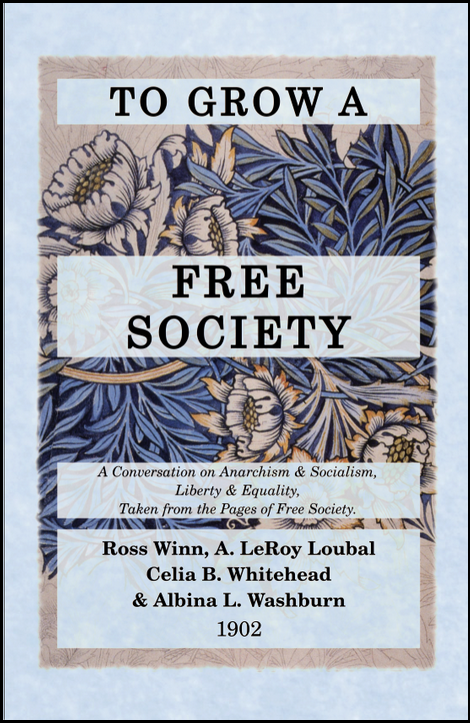C4SS has teamed up with the Distro of the Libertarian Left. The Distro produces and distribute zines and booklets on anarchism, market anarchist theory, counter-economics, and other movements for liberation. For every copy of ALL Distro’s “To Grow a Free Society” that you purchase through the Distro, C4SS will receive a percentage. Support C4SS with ALL Distro’s “To Grow a Free Society”.
$2.00 for the first copy. $1.50 for every additional copy.
This booklet brings together a short conversation on Anarchism and Socialism, Liberty and Equality that appeared in columns and correspondence in the pages of the anarchist-communist newspaper FREE SOCIETY in January – April of 1902. The Tennessee Anarchist Ross Winn (part of the Free Society editorial staff) and frequent contributor A. LeRoy Loubal open with intriguing developments of the ideal of individual liberty, individual economic independence and common, co-operative wealth without voting, elections, the “central hand” of institutional machinery, or political government. In the central essay, the Denver state-socialist and feminist Celia B. Whitehead challenges them for their plans for achieving equality without institutionalized government, asking, “How Will a Free Society Come, and How Will It Operate?” In three replies, Winn, Loubal, and the Denver feminist-Anarchist Albina L. Washburn each offer a different vision, one rooted in education and voluntary cooperation, one in resistance and decentralization, and one in mutualism and a strategy of counter-economics.
“IT SIMPLY CANNOT BE, AND THAT IS PRECISELY WHY I AM AN ANARCHIST. I do not believe that any scheme of government can be devised under the operation of which the interest of all would be subserved. This is because each individual must live his own life, and pursue his happiness in his own way. To the extent that men and women are left free to pursue their ideals and to follow their natural bent are they satisfied and friction is avoided. The strife and dissension in society, in every instance, is the outcropping of the spirit of authority. I want for every man, woman, and child the right to govern themselves, to direct their own affairs, to live their own lives. There fore I have no use for the government official. . . .” — Ross Winn.
“INDIVIDUALS CREATE WEALTH AND INDIVIDUALS SHOULD ENJOY IT. Commonwealth as an institution would enslave the individual, yet I would have wealth in common. . . . I believe that liberty and equality will usher in a fraternity that will annihilate commercialism and the greed of gain. With the land and opportunity free, the laborer will no longer work for others, but supply his own needs with his labor. With the wonderful facilities for manufacturing, the immense aids inventive genius has placed at our disposal, but usurped by government agents, every man could be independent, and the fear of poverty would be unknown, the incentive to accumulate wealth for any other purpose than use, would be gone. Rent, interest, and profit would pass away. . . . When competition dies, emulation will survive. When men labor for the love of their works, art and beauty will be in evidence.
“BUT THE ‘ANARCHISTS HAVE NOT SEEMED TO ME TO PRESENT any plan of action.’ Well, the governmental plan has been proposed by a good many parties, but wherever and however tried has completely failed. The Anarchist has no ‘plan of action’ to force men into some regime. They advocate liberty, and liberty cannot exist under regime. . . . It is an institution, a centralized organization, that is to say, individuals are going to be organs to be moved by a central hand. . . Now what of Anarchism, or absolute liberty? ‘But who would operate the machinery.’ What could be operated by individuals or the cooperation of individuals for individual interests would be preserved; the rest would not. Decentralization would be the plan or plain of Anarchism.” — A. LeRoy Loubal.
“IN ORDER SET ASIDE A GOVERNMENT, THE WAY TO ABOLISH IS TO ABOLISH; not by a furious onslaught of opposition, of money, party, guns, and power, but simply by letting alone. . .” — Albina L. Washburn.
Free Society (1895–1904), originally The Firebrand, was one of the leading English-language Anarchist newspapers in the united states during the “first wave” anarchist movement in the late 19th and early 20th century. Operating as a “comrades’ paper,” and featuring poetry, letters, movement news, theoretical debates and short fiction, the paper brought together voices from communist, mutualist and individualist Anarchist tendencies, featuring the work of writers such as C. L. James, Voltairine de Cleyre, Ross Winn, Kate Austin, James F. Morton Jr., E. C. Walker, Mary Hansen, Helena Born, Lizzie Holmes, and Michael Cohn, among many others.
The text is based on scans of pages from Free Society, vol. IX, available online through the Fair Use Repository’s digital archive. The cover is based on an 1873 design for the “Tulip and Willow” indigo-discharge wood-block print by William Morris, made available online through Wikipedia.








